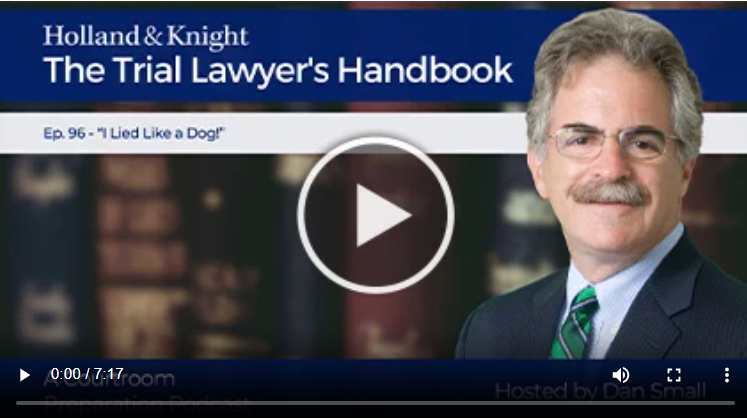- within Strategy topic(s)
In this episode of "The Trial Lawyer's Handbook" podcast series, litigation attorney Dan Small explores the critical issue of false testimony and its damaging effects on the justice system. Centered on the case of Charlotte Lightsey, a deputy sheriff and wife of the Appling County sheriff in Georgia, the story reveals how she aggressively lied before a grand jury to deny involvement in corruption and drug smuggling. Unbeknownst to her, one cooperating deputy was secretly recording their conversations, capturing her candid admission, "I lied like a damn dog!" This tape became crucial evidence leading to her conviction for perjury and contributing to a substantial prison sentence. The episode highlights the challenges of prosecuting perjury, the dangerous mindset that allows it and the vital importance of holding witnesses accountable to preserve the integrity of justice.
Podcast Transcript
Dan Small: False testimony cuts to the heart of our justice system. We depend on the witnesses' oath to tell "the truth, the whole truth and nothing but the truth" to maintain the integrity of that system. But when a witness lies at trial, it may keep vital evidence from the jury, and it may be even more damaging before a grand jury.
And yet, people try it so often and believe they can get away with it — and do, too often. After all, they lie all the time outside the court and nothing happens. Which is why prosecutions for perjury, though too rare and often difficult, are so important. There has to be an answer to the excuse that "everyone does it, nothing will happen."
Charlotte Lightsey was the wife of the sheriff of Appling County, Georgia, Joe Lightsey. She was also his deputy sheriff and, according to several folks, both the brains and the brawn of that couple. As someone put it: "If you have to get caught in a dark alley with one of them, choose the sheriff. Charlotte is much more dangerous!" Everything we saw and heard supported that conclusion.
As we've talked about in several prior episodes, I was a young trial attorney with the U.S. Department of Justice's Organized Crime Strike Force, working with the local U.S. Attorney's office to investigate drugs and corruption in Appling County, south Georgia. Once the investigation was underway, we subpoenaed several of the corrupt cops to the grand jury in Savannah. Some of them refused to answer, relying on their Fifth Amendment right against self-incrimination. Imagine: Law enforcement officers — sworn to uphold the law — refusing to answer direct questions about taking bribes to protect drug smuggling, because a truthful answer would incriminate them. Not a pretty picture, but they were invoking their constitutional rights.
But not Charlotte. Charlotte marched into the grand jury and denied it all, vehemently and aggressively. She knew nothing about bribes, knew nothing about drug smuggling. She would never violate her oath of office as a deputy sheriff, and shame on those federal prosecutors for trying to bamboozle these good jurors with lies and rumors. It was quite a show.
At that time, the drive the federal courthouse in Savannah, Georgia, to Appling County, Georgia, was I think about an hour and a half. Leaving the grand jury in the car, Sheriff Lightsey was driving. Charlotte was in the passenger seat, and two of the sheriff's deputies were in the back seat. All four had grown up together in the county, they'd known each other all their lives, and they trusted each other completely. However, unknown to the other three, we had confronted one of the deputies, and he had agreed to plead guilty and cooperate with the investigation. On this long drive home from the grand jury, he was wearing a wire, which picked up and recorded every word.
Naturally the conversation turned to the day's events. The plain loads of drugs came into the airstrip in South Georgia in Appling County on Friday nights when the rest of the county was on the other end at the high school for the Friday night football game, and they labeled each load by whatever town their local team was playing that night. Someone asked the sheriff what he had said to the grand jury when asked about the Reidsville load. "Oh," he said, "I took the Fifth on those questions. I didn't [want to] answer questions about that, who knows what they might know."
Charlotte was outraged at that show of weakness by her husband and boss. "What?" she said angrily. "You didn't just say no?" The sheriff was instantly defensive. "No, I didn't just say no, what did you say?" To which Charlotte responded, "Well I lied like hell! I did on a bunch of things!"
In the back seat, you could almost sense the cooperating deputy's unease. This was all new to him. They were in a moving car. He didn't have an earpiece or anything. How sensitive was the tape recorder we had given him to wear? Did it really pick up the extraordinary thing Charlotte had just admitted? It had, clear as a bell, but he couldn't know that. So, just in case, you could hear him shuffle a bit, lean forward and very innocently ask, "Do what, Charlotte?"
And Charlotte obliged. She turned around and explained to the deputy, right into the microphone: "I lied like a damn dog! They threaten you with perjury. They're not gonna charge anyone with any damn perjury, they're just saying that to try to scare you!"
She was right, of course. We did say that to her and the other witnesses to try to scare them into telling the truth. Too often, prosecutors don't have the evidence to back it up. This time, however, we did have the evidence, and that, combined with her taped admissions, was enough to indict her for perjury — among other crimes.
We played that tape at her trial — "I lied like a damn dog!" — and the jury convicted her. We played it again at her sentencing hearing — "I lied like a damn dog!" — and the outraged judge added the maximum five-year sentence for perjury on to her 15-year sentence for Racketeer Influenced and Corrupt Organizations (RICO) and drug smuggling, for a total sentence of 20 years.
Charlotte Lightsey's "I lied like a damn dog!" jail sentence didn't solve the problem of perjury by any stretch of the imagination, but it highlighted some of the attitudes and assumptions that encourage it, and the need for a strong response to protect our system of justice.
The content of this article is intended to provide a general guide to the subject matter. Specialist advice should be sought about your specific circumstances.


